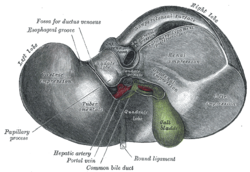
Summary
The round ligament of the liver, ligamentum teres or ligamentum teres hepatis is a ligament that forms part of the free edge of the falciform ligament of the liver. It connects the liver to the umbilicus. It is the remnant of the left umbilical vein. The round ligament divides the left part of the liver into medial and lateral sections.
| Round ligament of liver | |
|---|---|
 Liver seen from below, with the round ligament labeled at bottom. | |
 1: Right lobe of liver 2: Left lobe of liver 3: Quadrate lobe of liver 4: Round ligament of liver 5: Falciform ligament 6: Caudate lobe of liver 7: Inferior vena cava 8: Common bile duct 9: Hepatic artery 10: Portal vein 11: Cystic duct 12: Hepatic duct 13: Gallbladder | |
| Details | |
| Precursor | left umbilical vein |
| Identifiers | |
| Latin | ligamentum teres hepatis |
| MeSH | D000069592 |
| TA98 | A05.8.01.015 |
| TA2 | 5104 |
| FMA | 14079 |
| Anatomical terminology [edit on Wikidata] | |
Structure edit
The round ligament connects the liver to the umbilicus.[1] It divides the left part of the liver into medial and lateral sections.[2][3]
Development edit
The round ligament of the liver is the remnant of the umbilical vein during embryonic development.[1] It only exists in placental mammals.[4] After the child is born, the umbilical vein degenerates to fibrous tissue.[4]
The left portal vein (which gives branches to paraumbilical veins) is connected to the round ligament (ligamentum teres) and ligamentum venosum.[5]
Clinical significance edit
Portal hypertension edit
In adulthood, small paraumbilical veins remain in the substance of the ligament. These act as an important portacaval anastomosis in severe portal hypertension, resulting in a caput medusae.[6][7]
Abscess edit
Very rarely, the round ligament of the liver may develop an abscess. This usually requires liver surgery to treat.[1]
Landmark edit
The umbilical vein/round ligament inserts around the umbilicus, and is an important landmark of the inner surface of the anterior abdominal wall.[2]
Additional images edit
-
Round ligament of liver. Superior surface of liver.
See also edit
References edit
- ^ a b c Sumida, Wataru; Kawashima, Hiroshi; Ishimaru, Tetsuya; Ihara, Yoshiyuki; Kakihara, Tomo; Kato, Reiko; Hayashi, Kentaro; Aoyama, Tomohiro; Omata, Kanako (2019-05-01). "Abscess of ligamentum teres hepatis". Journal of Pediatric Surgery Case Reports. 44: 101198. doi:10.1016/j.epsc.2019.101198. ISSN 2213-5766.
- ^ a b Standring, Susan (2016). Gray's anatomy: the anatomical basis of clinical practice (41 ed.). Philadelphia: Elsevier. ISBN 978-0-7020-5230-9. OCLC 920806541.
- ^ Moore, Keith L.; Dalley II, Arthur F.; Agur, A.M.R. (2014). Clinically oriented anatomy (7 ed.). Philadelphia: Wolters Kluwer Health/Lippincott, Williams, & Wilkins. ISBN 978-1-4511-1945-9. OCLC 813301028.
- ^ a b Garbar, Veronica; Newton, Bruce W. (2020), "Anatomy, Abdomen and Pelvis, Falciform Ligament", StatPearls, Treasure Island (FL): StatPearls Publishing, PMID 30969680, retrieved 2021-01-24
- ^ Ryan, Stephanie (2011). "2". Anatomy for diagnostic imaging (Third ed.). Elsevier Ltd. p. 195. ISBN 9780702029714.
- ^ Foster, R J; Cowell, G W (2015-04-20). "Acute paraumbilical vein recanalization: an unusual complication of acute pancreatitis". BJR Case Reports. 1 (1): 20150021. doi:10.1259/bjrcr.20150021. ISSN 2055-7159. PMC 6159162. PMID 30363191.
- ^ Mostbeck, G. H.; Wittich, G. R.; Herold, C.; Vergesslich, K. A.; Walter, R. M.; Frotz, S.; Sommer, G. (February 1989). "Hemodynamic significance of the paraumbilical vein in portal hypertension: assessment with duplex US". Radiology. 170 (2): 339–342. doi:10.1148/radiology.170.2.2643137. ISSN 0033-8419. PMID 2643137.
External links edit
- Anatomy photo:38:12-0106 at the SUNY Downstate Medical Center - "Stomach, Spleen and Liver: The Visceral Surface of the Liver"
- Anatomy image:7819 at the SUNY Downstate Medical Center
- Overview at ucc.edu
- Illustration of Liver Anatomy including ligaments and structures


